2015 Middle East respiratory syndrome outbreak in South Korea
An outbreak of Middle East respiratory syndrome coronavirus occurred in South Korea from May 2015 to July 2015.[5] The virus, which causes Middle East respiratory syndrome (MERS), was a newly emerged betacoronavirus that was first identified in a patient from Saudi Arabia in April 2012. From the outbreak, a total of 186 cases have been infected, with a death toll of 38.[3]
| Coronavirus |
|---|
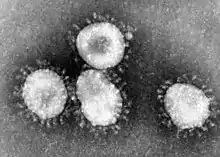 |
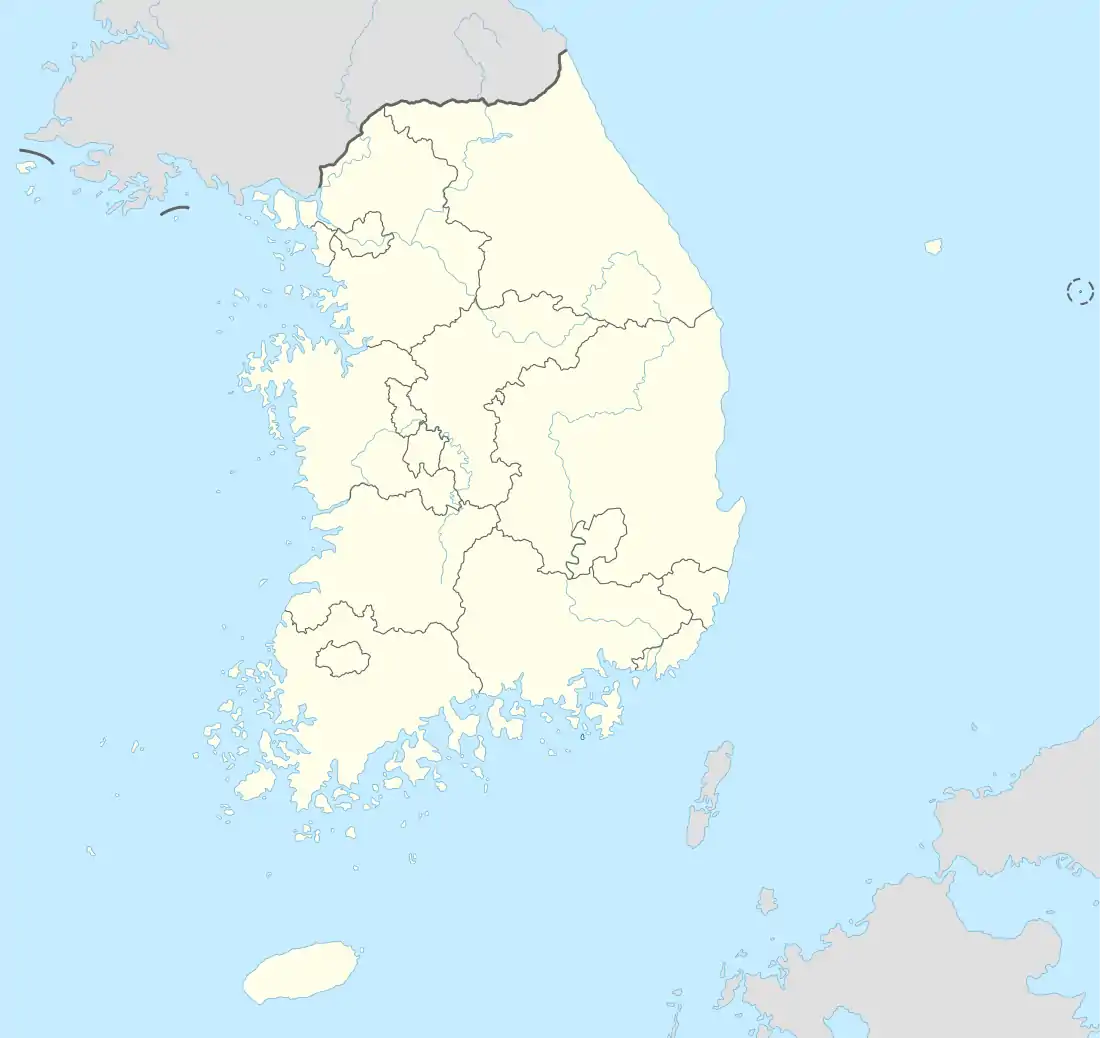 Seoul Pyeongtaek Daejeon Asan Hwaseong Busan Daegu Yongin Sokcho Gyeongju Sunchang Jeju Boryeong | |
| Date | 20 May 2015 – 28 July 2015 |
|---|---|
| Location | South Korea |
| Casualties | |
Outbreak
South Korea reported its first MERS case on 20 May 2015.[6] A 68-year-old man returning from the Middle East was diagnosed with MERS nine days after he initially sought medical help.[7]
The following table shows the daily statistics on the number of infected persons since 20 May 2015, based on the official report of the Central MERS Management Task Force, Ministry of Health and Welfare at the beginning of each day.[2][8]
| Date | Cases*1*2 | Deaths*2 |
|---|---|---|
| 20 May 2015 | 2 | 0 |
| 21 May 2015 | 3 | 0 |
| 26 May 2015 | 5 | 0 |
| 27 May 2015 | 5 | 0 |
| 28 May 2015 | 7 | 0 |
| 29 May 2015 | 13 | 0 |
| 30 May 2015 | 15 | 0 |
| 31 May 2015 | 18 | 0 |
| 1 June 2015 | 25 | 1 |
| 2 June 2015 | 30 | 1 |
| 3 June 2015 | 30 | 3 |
| 4 June 2015 | 36 | 4 |
| 5 June 2015 | 42 | 5 |
| 6 June 2015 | 64 | 5 |
| 7 June 2015 | 87 | 5 |
| 8 June 2015 | 95 | 7 |
| 9 June 2015 | 108 | 7 |
| 10 June 2015 | 122 | 9 |
| 11 June 2015 | 126 | 10 |
| 12 June 2015 | 138 | 13 |
| 13 June 2015 | 145 | 14 |
| 14 June 2015 | 150 | 16 |
| 15 June 2015 | 154 | 19 |
| 16 June 2015 | 162 | 19 |
| 17 June 2015 | 165 | 23 |
| 18 June 2015 | 166 | 24 |
| 19 June 2015 | 166 | 24 |
| 20 June 2015 | 169 | 25 |
| 21 June 2015 | 172 | 27 |
| 22 June 2015 | 175 | 27 |
| 23 June 2015 | 179 | 27 |
| 24 June 2015 | 180 | 29 |
| 25 June 2015 | 181 | 31 |
| 26 June 2015 | 182 | 31 |
| 27 June 2015 | 182 | 32 |
| 28 June 2015 | 182 | 32 |
| 29 June 2015 | 182 | 33 |
| 30 June 2015 | 182 | 33 |
| 1 July 2015 | 183 | 33 |
| 2 July 2015 | 184 | 33 |
| 3 July 2015 | 185 | 33 |
| 4 July 2015 | 186 | 33 |
| 5 July 2015 | 186 | 33 |
| 6 July 2015 | 186 | 33 |
| 7 July 2015 | 186 | 35 |
| 8 July 2015 | 186 | 35 |
| 9 July 2015 | 186 | 35 |
| 10 July 2015 | 186 | 36 |
| 11 July 2015 | 186 | 36 |
| 12 July 2015 | 186 | 36 |
| 13 July 2015 | 186 | 36 |
| 14 July 2015 | 186 | 36 |
| 15 July 2015 | 186 | 36 |
| 16 July 2015 | 186 | 36 |
| 17 July 2015 | 186 | 36 |
| 18 July 2015 | 186 | 36 |
| 19 July 2015 | 186 | 36 |
| 20 July 2015 | 186 | 36 |
| 21 July 2015 | 186 | 36 |
| 22 July 2015 | 186 | 36 |
| 23 July 2015 | 186 | 36 |
| 24 July 2015 | 186 | 36 |
| 25 July 2015 | 186 | 36 |
| 26 July 2015 | 186 | 36 |
| 27 July 2015 | 186 | 36 |
| 28 July 2015 ~ 24 October 2015 | 186 | 36 |
| 25 October 2015 | 186 | 37 |
| 26 October 2015 ~ 24 November 2015 | 186 | 37 |
| 25 November 2015 | 186 | 38 |
| 26 November 2015 ~ 28 September 2016 | 186 | 38 |
^*1 Includes a case reported in China[9]
^*2 Parentheses indicate interim value
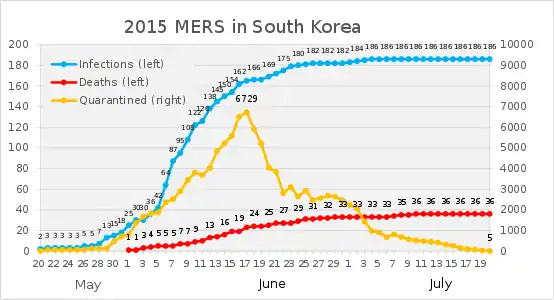 2015 MERS outbreak in South Korea
2015 MERS outbreak in South Korea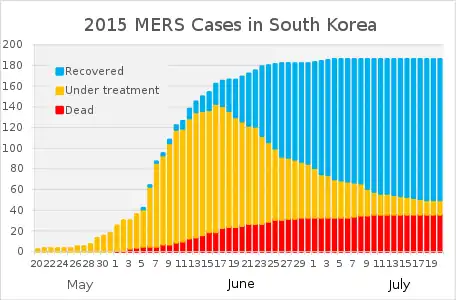 MERS confirmed cases status
MERS confirmed cases status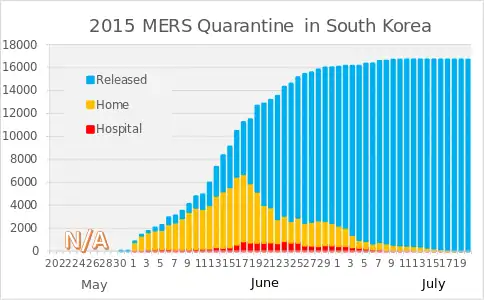 MERS quarantine status
MERS quarantine status
Main transmission route and event timeline
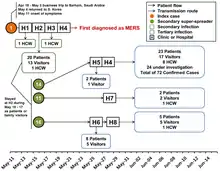
Key (see also within diagram):
H hospital / clinic
HCW health care worker
circled number patient case number
Dates are dates of diagnosis
Government reaction
The Korean Ministry of Health and Welfare initially withheld details from the public,[11] as identifying the medical institution treating a MERS patient might cause unnecessary anxiety to its other patients. This policy lacked public acceptance,[12] and was heavily criticized as preventing the Ministry from properly notifying hospitals and municipal governments. On 3 June, it was found that the Ministry had not notified the Incheon municipal government of the transfer of an infected patient to its local medical institution.[13] The following day the Seoul municipal government announced that it had learned by chance, through an official attending a meeting, that a hospital doctor, who began to show symptoms on 29 May and tested positive on 1 June, had been moving freely within the city and had attended a gathering of 1,565 people in Gaepo-dong on 30 May.[14] The municipal government obtained a list of the 1,565; the Ministry proposed to undertake "passive surveillance"; the municipal government rejected this as "lukewarm" and intervened directly: initially by contacting those listed.[14]
On 7 June, after 2,361 people were isolated, 64 patients were confirmed infected and 5 had died,[15] the central government finally disclosed the names of MERS-exposed medical institutions.[16]
Hospitals
On 7 June 2015, the South Korean government released the names of 24 MERS-affected hospitals to the public.[17] These hospitals include the Pyeongtaek St. Mary's (SeongMo) Hospital (평택성모병원) and the Seoul Samsung Hospital (삼성서울병원), an affiliate of Samsung Medical Center.[18][19][20]
| Hospital | Korean name | City/Province | No. of cases |
|---|---|---|---|
| Samsung Medical Centre | 삼성서울병원 | Gangnam-gu/ Seoul | 90 |
| Pyeongtaek St. Mary's Hospital | 평택성모병원 | Pyeongtaek/ Gyeonggi Province | 37 |
| Dae Cheong Hospital | 대청병원 | Seo-gu/ Daejeon | 14 |
| KonYang University Hospital | 건양대학교병원 | Seo-gu/ Daejeon | 11 |
| Hallym University Medical Centre | 한림대학교동탄성심병원 | Hwaseong/ Gyeonggi Province | 6 |
| Gangdong Gyeonghee University Hospital | 강동경희대학교의대병원 | Gangdong-gu/ Seoul | 5 |
| Gunguk University Hospital | 건국대병원 | Gwangjin-gu/ Seoul | 4 |
| Pyeongtaek Good Morning Hospital | 평택굿모닝병원 | Pyeongtaek/ Gyeonggi Province | 4 |
| Asan Seoul Clinic | 아산서울의원 | Asan / Chungnam Province | 1 |
| Yangji Samsung Medical Center | 양지 서울삼성의원 | Yongin/ Gyeonggi Province | 1 |
| 365 Yeol Lin Clinic | 365 열린의원 | Gangdong-gu/ Seoul | 1 |
| Yeouido St. Mary's Hospital | 가톨릭대학교 여의도성모병원 | Yeongdeungpo-gu/ Seoul | 1 |
| Asan Medical Center | 서울아산병원 | Songpa-gu/ Seoul | 1 |
| Good gang-an Hospital | 좋은강안병원 | Suyeong-gu/ Busan | 1 |
| Dr. Song Clinic | 송태의 내과 | Songpa-gu/ Seoul | 1 |
| Others (outside hospitals, under investigation) | 7 | ||
| Total | 186 | ||
Related incidents
A 44-year-old South Korean man travelled to Huizhou, China via Hong Kong,[22] on business, on 26 May, contrary to a doctor's advice and in breach of a self-quarantine order from the government: his father and elder sister were both confirmed infected by MERS.[23] He was later found to have a fever,[23] and was subsequently confirmed infected.[22] He was suspected of dishonestly failing to disclose to Hong Kong border quarantine officers that he had visited his father in hospital on 16 May for nearly 4 hours.[23]
On 30 May 2015, a website said that a driver in Huizhou who transported a South Korean male MERS patient was suspected to be infected but later the government clarified that this was a rumor.[24]
A Chinese fugitive who stayed in South Korea for 3 years turned himself in as he was afraid of the outbreak. He arrived at Dalian Zhoushuizi International Airport on 4 June.[25]
On 8 June 2015, a South Korean couple who did not follow the self-quarantine notice were found to have visited the Philippines on 6 June. They had visited the respective clinics in Sunchang County where a 72-year-old woman was confirmed positive for MERS after having visited the clinic for lumbago treatment. The couple said that they only knew that the 72-year-old woman was a MERS-positive patient only after reading the news.[26]
On 9 June 2015, two Hong Kong students from City University of Hong Kong doing a three-month exchange program in Sungkyunkwan University were ordered by a professor to get out of the classroom as they refused to remove their protective masks. The professor also said that they were too sensitive to the outbreak because of the history of SARS in Hong Kong in 2003. Sungkyunkwan University replied that some professors saw wearing masks as impolite and said if students insist on wearing masks, they might be refused to give presentations in class and may be unable to graduate due to this. Affected students said this reflected that the South Korean public was not attentive to the threat of the MERS outbreak.[27]
On 25 June, a South Korean man who had been treated at a Chinese hospital after being diagnosed with the MERS virus in late May, was released from the hospital and returned to South Korea.[28]
Effects
Education
The following table shows the number of schools that temporarily closed due to the outbreak:
| Date | Number of schools closed |
|---|---|
| 2 June 2015 | 84[29] |
| 3 June 2015 | 214[30] |
| 4 June 2015 | 1,162[31] |
| 5 June 2015 | 1,317[32] |
| 7 June 2015 | 1,381 (7 in Gyeonggi Province)[33] |
| 8 June 2015 | 1,970[34] |
| 9 June 2015 | 2,208[35] |
| 15 June 2015 | 475[36] |
Economy
On 11 June 2015, South Korea's central bank cut interest rates by 0.25 percentage points to stem the economic fallout from the outbreak.[37]
South Korea's department store sales decreased by 16.5% compared to the same period last year, and retail shops also decreased 3.4%, according to the Minister of Strategy and Finance, as of June 17, 2015.[38]
As of 17 June 2015, 100,000 tourist visits to the nation had been cancelled.[38]
Testing infrastructure
After the outbreak, South Korea developed a system to rapidly expand testing capabilities during future disease outbreaks. This has been credited as a reason for South Korea's widespread testing and effective response to the COVID-19 pandemic.[39]
See also
References
- "Hospitals with Known MERS Exposure (June 22)". Ministry of Health and Welfare. June 22, 2015. Archived from the original on June 30, 2015.
- 알림> 보도자료 목록 - '메르스' 검색결과 [Press release - Search result 'MERS'] (in Korean). Ministry of Health and Welfare. Retrieved 9 June 2015.
- "Middle East respiratory syndrome coronavirus (MERS-CoV) – Republic of Korea". World Health Organization. Retrieved 2016-12-01.
- "[그래픽뉴스]메르스 환자 현황 (6월14일 점심)". news1korea (in Korean). 14 June 2015. Retrieved 14 June 2015.
- "South Korea declares 'end' to Mers". 28 July 2015 – via www.bbc.com.
- "S. Korea reports 23 new cases of MERS, bringing total to 87". Yonhap News Agency. 8 June 2015. Retrieved 8 June 2015.
- "South Korea MERS Outbreak Began With a Cough". The Wall Street Journal. 8 June 2015. Retrieved 12 June 2015.
- "메르스 확진자 총 150명, 현재 120명 치료 중". Ministry of Health and Welfare. June 15, 2015.
- "Middle East respiratory syndrome coronavirus (MERS-CoV)". World Health Organization.
- Jack, A (2015). "Why the panic? South Korea's MERS response questioned". BMJ. 350: h3403. doi:10.1136/bmj.h3403. PMID 26108610.
- Herald, The Korea (2015-06-02). "Korea mulling disclosure of MERS-affected hospitals". Retrieved 2016-09-28.
- "메르스 발생 병원, 공개 안하겠다는 정부..국민들은 반발". Daum 뉴스. Retrieved 2016-09-28.
- 중부일보. "정부, 메르스 환자 인천으로 은밀히 이송...市 '깜깜' 당혹". Retrieved 2016-09-28.
- "[2015] Mayor's Speech As Head of the Anti-MERS MERS Headquarters, I will Address even the Smallest Problems".
- "[KBS뉴스] 메르스 감염 실태, 한눈에 보기". dj.kbs.co.kr. Retrieved 2016-09-28.
- Herald, The Korea (2015-06-07). "S. Korea identifies 24 MERS-affected hospitals". Retrieved 2016-09-28.
- "S. Korea identifies 24 MERS-affected hospitals". Yonhap News Agency. 8 June 2015. Retrieved 8 June 2015.
- 정부, 메르스 환자 발생·경유 병원 24곳 공개. The Chosun Ilbo (in Korean). 7 June 2015. Retrieved 8 June 2015.
- 메르스 병원 '24곳' 명단 공개… 경유병원만 '18곳'. www.moneyweek.co.kr (in Korean). 8 June 2015. Retrieved 8 June 2015.
- "MERS-Affected Hospitals". www.google.com. 8 June 2015. Retrieved 8 June 2015.
- "Middle East respiratory syndrome coronavirus (MERS-CoV)". World Health Organization.
- "China's first confirmed MERS case arrived from Korea via Hong Kong". 2015-05-29. Retrieved 2015-06-09.
- (in Chinese) "疑中招韓男隱瞞病歷經港往惠州新沙士殺到". 蘋果日報. 2015-05-29. Retrieved 2015-06-09.
- (in Chinese) "广东惠州接MERS患者司机疑被传染 官方辟谣". China Central Television. 2015-05-30. Retrieved 2015-06-01.
- (in Chinese) "一外逃韩国经济犯担心染上MERS 权衡利弊回国自首". 北青网. 2015-06-05. Retrieved 2015-06-05.
- "S. Korean couple under MERS suspicion visit PH". Manila Bulletin. 2015-06-08. Retrieved 2015-06-09.
- "本月餘下南韓團或取消 交流生批韓缺防疫意識". TVB. 2015-06-08. Archived from the original on June 10, 2015. Retrieved 2015-06-09.
- "S. Korean MERS patient in China recovered, released from hospital". Yonhap News Agency. 26 June 2015.
- "'메르스 불안' 전국 학교 휴업 100곳 육박". KBS. 2015-06-02. Retrieved 2015-06-02.
- 신상윤 (2015-06-03). "[메르스 쇼크]전국 214개교 휴교 또는 휴업…"학생 감염 막기위해 적극적 방역"". 헤럴드경제. Retrieved 2015-06-03.
- 최희진; 박성진; 김보미 (2015-06-05). "메르스 방역, 서울이 뚫렸다… 감염 확진 서울 의사, 시민 1500여명과 접촉". Kyunghyang Shinmun. Retrieved 2015-06-05.
- 박정양 (2015-06-05). "전국 1317개교 '메르스 휴업'…서울 99개교". 뉴스원. Retrieved 2015-06-05.
- 김병덕 (2015-06-07). "서울·경기 1381개 유치원·학교 강제 휴업명령". 파이넨셜뉴스. Retrieved 2015-06-07.
- 노재현 (2015-06-08). "메르스 휴업 유치원·학교 1천970곳…전국 10곳 중 1곳". Yonhap News Agency. Retrieved 2015-06-08.
- 박정양 (2015-06-09). "전국 2208개 학교 '메르스 휴업'…오후 확산세 '주춤'". 뉴스원. Retrieved 2015-06-09.
- 노재현 (2015-06-15). "교육부 "메르스 휴업 유치원·학교 475곳"". 연합뉴스. Retrieved 2015-06-15.
- "S Korea cuts interest rates to record low amid Mers concerns". BBC News. Retrieved 29 June 2015.
- "South Korea MERS death toll at 20; 8 more cases diagnosed". CNN International. 17 June 2015. Retrieved 17 June 2015.
- "Virus Testing Blitz Appears to Keep Korea Death Rate Low". Bloomberg.com. 4 March 2020. Retrieved 21 March 2020.
External links
- MERS.go.kr, Korea Centers for Disease Control and Prevention
- MERS Propagation Path, infographics by KBS News (in Korean).
- Anatomy of the South Korean MERS outbreak, infographics by Science News